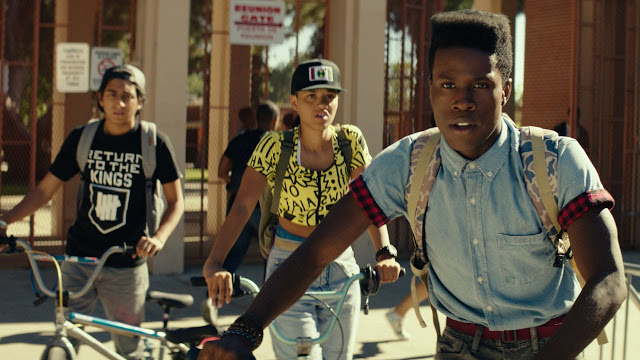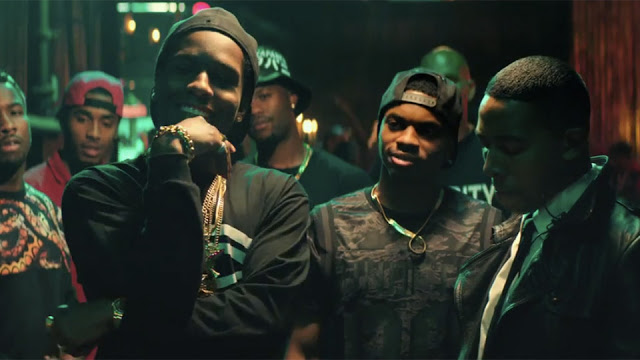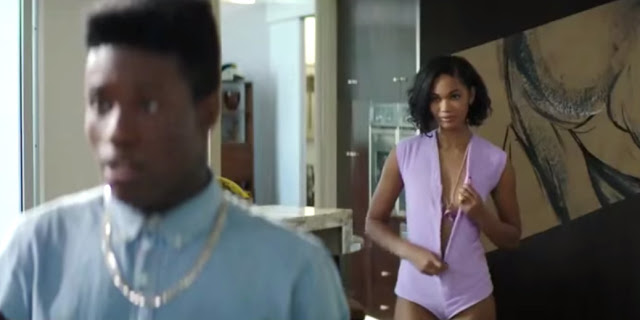An early scene in Dope, Rick Famuyiwa’s highly entertaining mess of a movie, perfectly encapsulates the film’s tone. It features its protagonist, a black high school student named Malcolm (Shameik Moore), fleeing with his two best friends from a pair of Los Angeles gangsters. It’s a frenetic scene, with Malcolm and his pals riding pitiful bicycles while the thugs give chase in a roaring red El Camino. Then, as the desperate teenagers pedal across an overpass, the camera suddenly switches to a static wide-shot, revealing that the overpass is labeled, in austere capital letters, “Thurgood Marshall Justice Plaza.” That level of silent wit—the confidence to quietly slip in a reference to America’s first black Supreme Court Justice in the middle of a frenzied chase sequence—is indicative of Dope‘s sly sense of humor, not to mention its hectic, erratic sensibility. This mélange of styles and tropes is far too chaotic to be a great movie, but it’s precisely that sense of unruliness that makes it so much fun.
Dope initially scans as a lively satire of Boyz N the Hood, John Singleton’s seminal coming-of-age story about black youths growing up on hard streets in hard times. Malcolm, the son of a single mother, lives in The Bottoms, a crime-ridden district of Inglewood. His neighborhood is swimming in drugs and beset by gang violence (the red-clad Bloods are especially prominent), and he’s under constant threat of thievery or worse. Yet Malcolm, contrary to expectation, is neither a reprobate nor a victim. He is instead, as Forest Whitaker’s playful opening voiceover informs us, a geek. He dresses like a goofball, he rocks a ludicrous high-top fade, and he and his aforementioned friends, Jib (Tony Revolori, the lobby boy from The Grand Budapest Hotel) and Diggy (Transparent‘s Kiersey Clemons), are utterly obsessed with ’90s hip-hop culture. His top priority is not avoiding jail or scoring drugs—it’s getting into college, which is why he’s penned a singular application essay entitled, “A Research Thesis to Discover Ice Cube’s Good Day.”
That’s another funny Boyz N the Hood reference, but Dope‘s truest cinematic precursor is actually—and this will surprise you—Risky Business. As in that film, its high-school hero has his sights set on the Ivy League (Tom Cruise was shooting for Princeton, but Malcolm is aiming for Harvard). And as in that film, its hero quickly finds himself entangled with the criminal element (sadly, Joe Pantoliano doesn’t reprise his role as “Guido the Killer Pimp”), resulting in both panic and opportunity. Malcolm typically operates on the straight-and-narrow, but his life curves when he stumbles into Dom (the rapper A$ap Rocky, relaxed and amiable), a dealer who invites Malcolm to his birthday party. Through a combination of questionable judgment and teenage lust—he has eyes on Dom’s sorta-girlfriend, Nakia (a sexy but shaky Zoë Kravitz)—Malcolm shows up and sneaks in, though not before the bouncer educates him about the bar’s “proper nigga-to-ho ratio” (ripping off Craig Robinson’s Knocked Up monologue in the process). Eventually, gunfire erupts, and while Malcolm appears to escape unscathed, the next day he looks in his backpack and finds a pistol, along with four bricks of molly. And here he thought his biggest worry was the SATs.
To say Malcolm’s life proceeds to spiral out of control fails to properly credit both the sprawl of Dope‘s ambition and the absurdity of its plot. Famuyiwa’s approach is almost willfully undisciplined—he crams Dope with so much busyness that its quality material threatens to leak out, replaced by flaky subplots and bizarre flourishes. In the main, after evading the gangsters who seek to acquire Dom’s drugs, Malcolm reluctantly becomes a dealer himself, but only to secure his chances of getting into Harvard. (No, really.) This leads to him setting up an electronic distribution network with the help of his white friend Will (Workaholics‘ Blake Anderson, enjoying himself), allowing Famuyiwa to comment on the efficacy of technological services like Instagram, Twitter, and Bitcoin. And while Malcolm is playing the boyhood Walter White and attempting to romance Nakia, Famuyiwa pushes the film in a half-dozen additional directions, throwing in a shootout at a doughnut shop, a winking cameo from Rick Fox, and an outrageously titillating game of “Mother, May I?”
This is all a lot of fun, even if it is also a lot of nonsense. This, in turn, is slightly problematic, because Dope wants to be more than just a smashing good time. Beneath its surface pleasures (of which there are many), it seeks to be a searching and stimulating inquiry into the hot-button topic of American race relations. Its “research thesis”, to borrow a phrase from Malcolm, is that race is about perception, and that we judge people based not on who they are, but on what we see. This is not an especially revolutionary idea, and as gratifying as it is to watch a movie actively engage on the subject of race, Dope‘s thesis is neither provocative nor persuasive. It may be that the film has too much else going on to carry any real intellectual weight, or that it simply faces the misfortune of recalling Dear White People, another recent movie about smart young black students that grappled with race in ways both more resonant and more dynamic. Either way, Dope never fully succeeds in its noble effort to smuggle potent ideas inside its batty narrative.
That’s a pity, but it shouldn’t detract too heavily from what is, for the most part, a thoroughly enjoyable experience. Dope may be bonkers, but it’s brimming with interesting material, and Famuyiwa fills in the margins with flavor and panache. The whipsaw editing occasionally feels like Tarantino Lite, but it livens things up, and the soundtrack (featuring original music by Pharrell Williams) thumps with enthusiasm. And the minor details are real treats, like how one gangster tracks Malcolm via Apple’s “find an iPhone” app (and offers up some hilariously profane flattery of Steve Jobs), or how the narrator, in describing all of the white-people stuff that Malcolm and his friends admire, casually mentions Donald Glover. There is a detailed discussion of the metaphor “slippery slope”, as well as a debate about who exactly is allowed to say the word “nigger”, which, while hardly original, is both a funny digression and a secretly insightful recognition of the power of language.
Not everything works, of course. The romance between Malcolm and Nakia isn’t remotely credible, and a number of scenes, like when a gangster demands that Malcolm punch him in the face to demonstrate his manhood, just die on the comedy vine. But the hits comfortably outnumber the misses, and the result is a freewheeling film that’s undeniably entertaining, even when it’s careening out of control. Dope may have wanted to be an important movie, but it happily settles for being a fun one. Like its subject, it’ll get you high. Just not the kind of high that lasts.
Jeremy Beck is the editor-in-chief of MovieManifesto. He watches more movies and television than he probably should.



